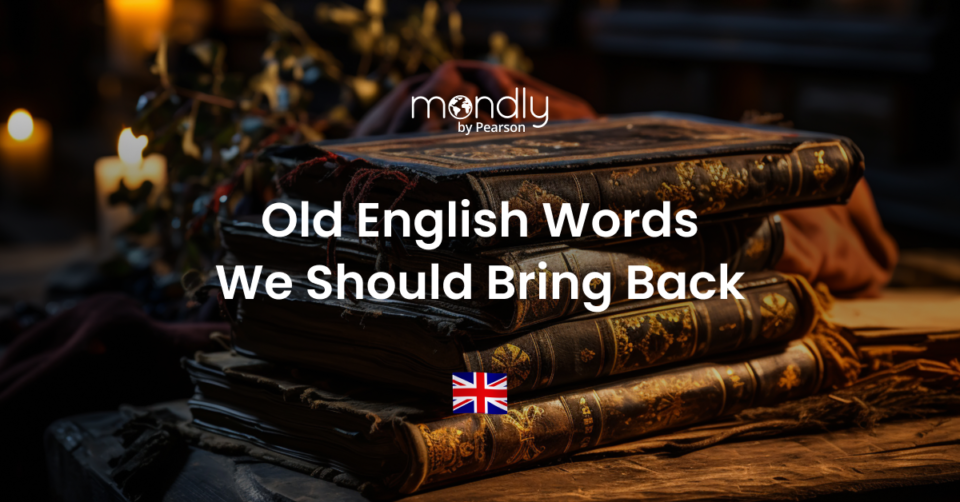World Teachers’ Day | How to say “teacher” in different languages
Teachers are the best people in the world. They always go above and beyond to support their students. Let's wish them all "Happy teachers' Day!"
Brace thyself! Thy Englisc is about to be most wondrously enriched.

Exploring Old English words is always a never-ending game of fun. Not only does Old English provide a window into a faraway past, but it also changes our perspective on it. We often imagine our ancestors as completely preoccupied with wars, famine, and disease, but as it turns out, they, too, liked to stay in bed late! According to a 16th-century word, such a person was known as a ‘slugabed’. But is this an Old English word or just an old English word? And does the difference even matter? Let’s find out.
Before we move on to the next topic of discussion for Old English, there are a few clarifications we need to make.
Firstly, all the Old English words in this article have been adapted with spellings that are easier to read in Modern English. This involves replacing special characters like “ǣ” (long “a” sound), “æ” (pronounced like “a” in “cat”), “þ” (thorn, pronounced “th”), and “ð” (eth, also pronounced “th”) with their Modern English equivalents. A great resources for further reading and exploration on that is the Bosworth Toller’s dictionary.
Secondly, in the case of pronouns like “you” and “I”, you need to know that Old English, much like Latin, was a bit more complicated than Modern English. Thus, the pronouns depended on whether you were addressing one or more persons, as well as the grammatical case. For example, singural “you” in Old English had four different forms:
The beauty of Old English words comes not necessarily from their form but from their ability to connect us with our roots. Speaking the same words uttered by our ancestors hundreds of years ago has a special effect unlike anything else.
Take Beowulf as an example. This epic poem, written in Old English over a thousand years ago, is one of the oldest surviving works of English literature. Though much of its language may seem foreign to us today, certain words still carry echoes of the past. Words like ‘wyrd’ (fate), ‘beorn’ (warrior) and ‘medu’ (mead) evoke a time when people told stories around the fire. A time when they fought, but also lived life to the fullest.
Today, English is still beautiful, but it has become faster and more efficient. Designed for quick communication rather than deep expression. We crave more abbreviations, more shortcuts, slang and corporate jargon. But what if we slowed down? What if we reclaimed Old English words that make us feel something, that remind us of the richness and rhythm language once had?
Maybe it’s time to bring some Old English back. Not just into our vocabulary, but into the way we experience the world.
So, what is the difference between Old English words and old English words? First, we need to define what Old English actually means.
Old English is the earliest recorded form of the English language, spoken in England and parts of Scotland between c. 450 and 1150 by the Anglo-Saxons. It developed after the collapse of Roman Britain in the early 5th century and was heavily influenced by Germanic languages.
Historians agree that the transition into what is now known as Middle English began after the Norman Conquest of 1066, when the upper classes replaced Old English with Anglo-Norman. Though this shift only lasted a few centuries, it had a lasting impact on the development of the English language as we know it today.
Many people mistakenly refer to Shakespearean English as “Old English,” but it’s important to note that Old English would be almost unrecognizable to modern speakers. And while some of Shakespeare’s words may seem old to us in 2025, they are not, in fact, from the Old English period.
Thus, Old English words are words from the Old English language, used between 450 and 1150 AD. ‘Plain’ old English words, on the other hand, are simply outdated words from later centuries that have fallen out of use.

The English language is constantly bombarded with new words from every generation. So why not bring back some old words for a change instead of inventing yet another slang term?
Sure, slang is cool, but not as cool as… elflock, for example! This term is obviously obsolete today (probably because we stopped believing in elves), but in the late 1500s, it was used to describe a tangled lock of hair. Back then, people believed that fairies or elves knotted children’s hair as they played in it during the night. A little bit of that magic wouldn’t hurt nowadays, right?
We’re exaggerating for the sake of argument, but you get the point! Whether they come from the Old English, Middle English, or Early Modern English period, many forgotten words deserve a comeback. Some for their beauty, and some simply because they’re super fun! Read on to discover both.
These Old English words about feelings might just be the most beautiful thing you’ll read today. As it turns out, the Anglo-Saxons had a surprisingly rich vocabulary for describing emotions. Many of these words capture feelings we still experience today, but struggle to express in a single word.
Here are 15 words that prove why Old English deserves a comeback.
Funny Old English words are probably the reason you’re here, right? And who are we to disappoint? Here are some true Old English words that might just make you smile:
As we’ve already established, the following words aren’t technically from the Old English period. However, they’re still old and undeniably amusing!
Our journey through the English language wouldn’t be complete without a proper Old English example. You now know some Old English words, but how did they sound in context? Let’s explore some real phrases from our ancestors.

Beyond their meanings, many old or ancient English words tell fascinating stories of daily life and human emotions in a world long gone. Before you go, let’s further explore some such ancient English words and their meanings.
Old English is the earliest form of the English language, spoken between around 450 and 1150 AD by the Anglo-Saxons. It evolved from the Germanic dialects brought to Britain by Anglo-Saxon settlers and was heavily influenced by Old Norse due to Viking invasions, as well as Latin through Christian missionaries.
Using Old English words is like reconnecting with our linguistic roots. They offer more than just their meanings. They carry with them a sense of history and culture that enriches our vocabulary. Plus, they have a poetic and rhythmic quality that modern English sometimes lacks.
Some Old English words might be tricky at first glance, mainly because of their unique spellings and pronunciations. However, with modern adaptations of their spelling, they become much easier to read and understand. For example, þu becomes thou, and ic becomes I, which are closer to what we know today. It may take a little practice to get the hang of them, but with context, many Old English words are surprisingly easy to grasp, especially when we look at how they have evolved into our current language.
Absolutely! Old English words can add flavor, humor, and emotion to modern writing. While they might not fit into every sentence, carefully chosen Old English words can evoke a sense of nostalgia or give a piece of writing a unique tone. Whether you’re writing creatively, making your point in an essay, or even creating fun social media content, these words can help you stand out.
In conclusion, diving into Old English words is like opening a window into a time long past, offering us a chance to connect with our roots. These words aren’t just old, they’re full of life, meaning, and a rhythm that modern English sometimes lacks. Whether it’s the deep sense of fate in wyrd or the humor in attercop, Old English has a lot to offer. While some of these words may no longer be in everyday use, they still carry echoes from a time when the English language was even richer. So, why not bring them back? By reviving Old English words, we not only enrich our vocabulary but also keep a little piece of history alive in the way we speak today.
Dost thou desire to improve thy English with speed and ease? Look no further than Mondly, the award-winning language app that doth make learning a joy.
Say goodbye to tedious hours with tomes too weighty to lift, and instead, embrace the delight of 10-minute lessons. With Mondly, thou wilt learn English through:
Begin thy journey with Mondly, for naught or for free on thy computer, or download the app and learn anytime, any place.

Teachers are the best people in the world. They always go above and beyond to support their students. Let's wish them all "Happy teachers' Day!"

Good news! Japanese numbers are easy peasy Japanesey. 🎌💯

When learning a new language you are faced with a choice: dip your toes or follow the immersion route. Which one will you choose?